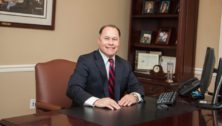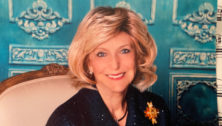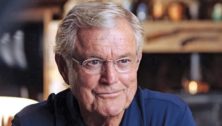Bucks County Leadership: Felicia Ganther, President, Bucks County Community College
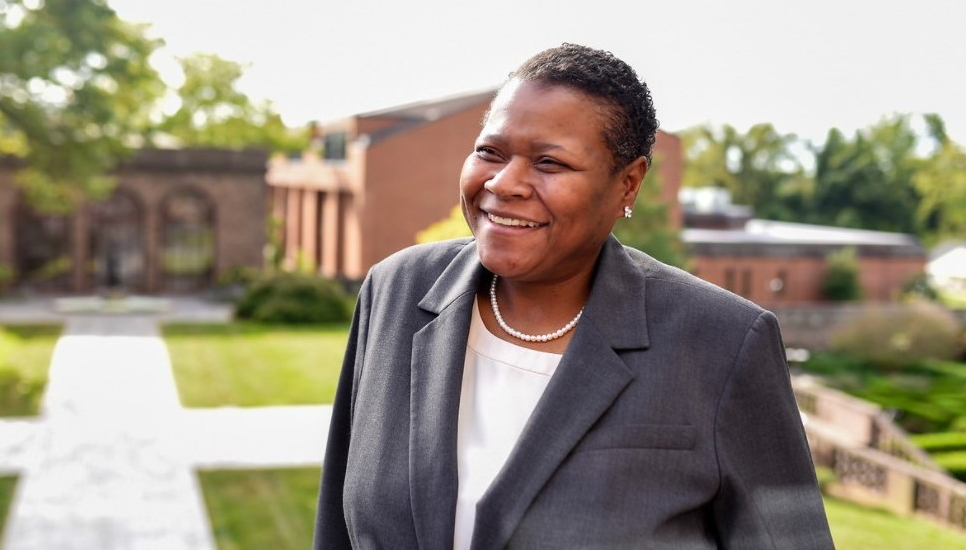
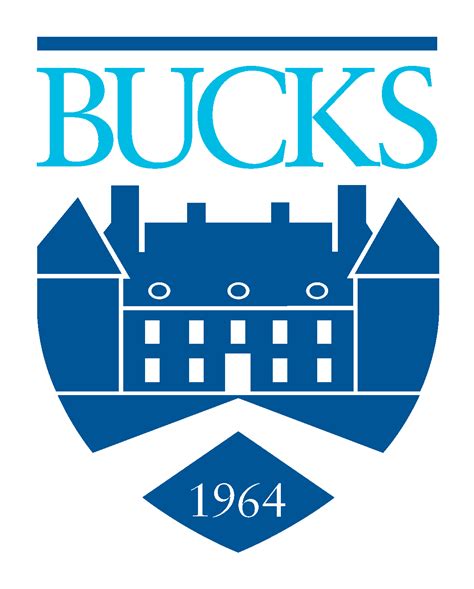
Felicia Ganther, the President of Bucks County Community College, spoke with BUCKSCO Today about being born in Kansas and growing up in southern California; being the first youth appointed to the Board of the American Red Cross in Pasadena and sitting on the city’s first Youth Council; and her first job selling concessions for a minor-league baseball team.
Ganther also discussed her decision to attend college across the country at Norfolk State University, where she was the first female student body president; how she landed at Bucks County Community College; her biggest surprise since moving to the area; and what she’s focused on with her work at the college.
Where were you born, and where did you grow up, Dr. Ganther?
I was born the oldest of three children — my two younger sisters are twins — in Wichita, Kansas. When I was a baby, my father worked for NASA’s Jet Propulsion Laboratory, and he was called back to work in California. I was raised in the Pasadena, Los Angeles area.
What did your father do for Jet Propulsion Labs?
He was an associate engineer. His role was to identify what parts were needed when an engineering team designed an apparatus. He would then go across the United States to find the necessary components to build the device.
What did your mom do?
My mom was a special education teacher. She first taught elementary school before moving to high school. She was also a California State Union Rep.
What memories do you have of growing up in California?
My fondest memories are going back to Kansas during the summers. My grandmother taught us how to do all kinds of things. She also taught me how to drive tractors, even though I was only seven or eight years old. She taught me to fish, pick fruit, and collect cans, bottles, and newspapers for recycling. Sustainability was her thing.
Even extermination! One summer, my grandmother had my three male cousins and me hammering and burning wasp nests.
She taught us how to use our hands and use our minds. That’s where my work ethic came from.
In California, my fondest memories are all the things I did as a young person. I was the first youth appointed to the Board of the American Red Cross in Pasadena. I sat on the first Youth Council for the City of Pasadena. I traveled to do HIV/AIDS task force for teens. I had a high level of involvement in my high school. Prior to high school, it was work ethic, country living, and living off the land. I would have never experienced those things if I hadn’t gone back to Kansas and Oklahoma.
When you went into high school, you already knew who you were.
No, I was very secure in who I was! Going into high school, I knew I wanted to be a student leader and help people. I knew that various causes, such as AIDS, were important to me at the time because they were impacting us.
You came to the AIDS crisis before anyone else did.
Yes, that’s true. During that time, there was the HIV/AIDS crisis and issues around gangs and gun violence. There was also the proliferation of drugs. It was important to me to be a part of the solution and not just a bystander watching things happen.
You were very young. Where did your true north compass come from?
I have to say it came from my mother and our family beliefs, our Christian principles of helping others. I watched my mother and my grandmother be very concerned about other people.
My mom really invested herself in kids’ lives, kids who people just didn’t think were going anywhere. She worked with her special ed students to get them into college. She was very involved in the community, as well. I hated going places with my mom, especially the grocery store because everyone would stop to talk with her. She was a connector, so people would ask her for advice.
That’s one of the greatest skills that I learned from her. You don’t always have to be the person who leads or solves the problem. Sometimes it’s better to be in the background, connecting the right people, so the magic can happen.
Did you play any sports in high school?
I played soccer and threw the shot put. I was also in the marching band.
Did you have a favorite activity?
Probably music. I thought I wanted to be Quincy Jones or Prince when I was younger. I wanted to play every instrument, go to Berkley College of Music, and be a big music producer. My mom politely told me that I did not like to practice, so I should rethink that as my career. She was right!
I played the clarinet in the band, but my favorite instrument in the bass clarinet. My music director in the 11th grade found a piece that had a bass clarinet solo, and that was the only time I practiced ad nauseam. I wanted to make sure I got it right.
Outside of band, what kind of music were you listening to?
Around the holidays, it’s Handel’s Messiah. If you get me during the week, it’s probably gospel music. My favorite singer of all time is Nat King Cole.
I grew up when hip hop and rap were exploding. At the same time, the kids in my neighborhood were listening to Duran Duran, Depeche Mode, and U2.
If you get into the car with me, you have no idea what I’m about to play. I had to be very creative in how I made my cassette tapes to cover all the music.
Did you have any jobs growing up?
My first job was a summer job for a farm team for the New York Mets in Wichita, Kansas, selling concessions. I would walk up and down the stands selling sodas and popcorn. It was my first part-time and the first job I got fired from!
Why did you get fired, Felicia?
Compared to the other kids, I was small, so I couldn’t carry the malts. The malts were in a cooler, and I couldn’t get the cooler up and down the stairs. The boss told me I was fired if I couldn’t carry the malts. To this day, I don’t eat malt!
Was there a part-time or full-time job that helped you become the person you are today?
I worked in the University Center as a Recreation Aide when I was a student at Norfolk State University. From there, I got on the programming board, which a gentleman named Mr. Jarvis oversaw.
I couldn’t believe someone could do that for a living, creating an environment of enjoyment and fun, and got paid to do it. That was a pivotal experience for me. I went from wanting to be a politician and go to law school to wanting to be a college student personnel administrator.
My family was not too happy with my decision to shift, but I felt that was where my calling was and I could be supportive of young people like myself. They need someone to invest in them, believe in them, and plant seeds of greatness in them. So, that’s what I did!
How did you end up going to college on the other side of the country at Norfolk State?
Growing up in Southern California, we are slightly bougie. We pay for a lot of services. At the time, there were college clearinghouses. These were companies that would assist you in getting an application ready for the U.C. system. I went to one clearinghouse, and then my friend told me there was a historically black university clearinghouse. We paid the fee, did an assessment, and were provided with a list of colleges that would fit our desires and personalities. Norfolk State was on that list.
The gentleman who owned the clearinghouse sent a letter of interest to Norfolk and the three other colleges on my list, and Norfolk State sent back a package with a tape showing me what it was like to go to school there. I said right away, that’s where I’m going. It would have been beneficial for me to stay in the U.C. system, especially with all the AP credits I had, but I knew that’s where I wanted to go. So, I went from the Pacific Ocean to the Atlantic Ocean.
That’s an amazing jump for an 18-year-old, especially against your parents’ wishes. Looking back, was Norfolk State a wise choice?
Absolutely! I don’t think I could relive my life any other way. The experience that I had, my time there, being around African Americans who graduated from Harvard and Yale, who had done research; they just had very high expectations for us. Not to say that I would have ever fallen through the cracks, but if I went to a large institution like U.C. Berkley, it wouldn’t have mattered much if I did well or didn’t do well. At Norfolk, the faculty had very high expectations. They focused and honed in on helping me to be successful. I learned a great deal inside the classroom and outside.
Did they appreciate what they had in you?
I think so. I was the first female student body president at Norfolk State. I was just on the phone yesterday with the student government advisor, Mrs. Valerie Holmes, who worked for 50 years and just retired from the University, and she said, “when you love what you do, and you love the impact that you have on the young people who come your way, it’s not a job.”
That really touched me. A lot of individuals, once they get to retirement, they’re out. To stay 50 years, it’s remarkable.
When you look back over your career, who were the people who saw promise and opened doors for you?
When I was in elementary school, the principal, Mr. Norman, who surprisingly was from Wichita, Kansas, was a great man. He was very encouraging. I would come by the office, and we’d sit and talk about Wichita or he’d give me words of encouragement. When I would see him outside of school, he would call me out and ask how I was doing.
When I got to high school, I had Mrs. Allen as a Vice Principal, and she taught me how to be a good programmer and project planner. Another one is my English teacher, Mr. Haussler.
There are so many people in college that I couldn’t even name them all. Dr. Baker, Dr. Escoffery, Dr. Newby-Alexander, Dr. Alexander, Dr. Barnes, Mr. Nick, Ms. Timberlake, Mrs. Goffigan, the Jarvis’, Dean Lowe. They are still my mentors to this day. From 1990 to this day. Many of them are still working at the University. They continued to plant seeds of greatness and helping not just me, but all students, by saying you have a meaning in this world, and you must go after it.
Tell me how you found out about the opportunity at Bucks County and how you ended up in eastern Pennsylvania.
I had never heard of Bucks County!
I am an Aspen Fellow, a very high designation in the community college world. I am constantly receiving nominations, or search firms call me to say someone nominated me. For the last three years, I would tell the search firms if they couldn’t tell me who nominated me and why; I don’t believe that I was nominated, and you got my name from the Aspen Fellows. A woman at the search firm was kind of shocked when I did this and called back a few days later. She told me that a good colleague of mine nominated me, so I conversed with her a little about the position before doing my own research.
I have a very similar experience. I was an administrator in the county that borders Chicago, with similar demographics – high levels of affluence and pockets of poverty and similar racial demographics. I understood the lay of the land and could transfer what I knew to the area. It looked like a good fit.
What are your priorities? What are you focused on?
The first thing is enrollment. Before COVID, Bucks County Community College has seen a decline in enrollment. The viability of an institution is predicated on enrollment and local and state funding. We know local and state funding will stay status quo and might decrease, so you must sure up your enrollment to sustain the institution.
The second thing is creating the new normal. Not only for the students but also for the employees and the community. How do we navigate this together? The majority of our students are interested in coming back to campus. They want to be in the classroom and have the college experience.
As the President, how do I bring that to fruition but also understand that our employees are experiencing COVID pandemic issues as well? So, balancing that and then also being open and available to the community so that we can be supportive. Whether it’s providing performing arts or a space for a community organization to meet. It’s a balancing act.
What do you do with your free time?
I love music, so anything that has to do with music: concerts, plays, playing music, listening to music. I love spending time with family. I am a grandmom; my grandson was born a month ago, so I’m focused on him. I also love to travel.
What’s been the biggest surprise coming into Bucks County?
All the winding roads! Even Swamp Road, how many turns can I make, and I’m still on the same street? Four to seven miles away is like 15-20 minutes given the road that you go.
Another thing is that people are so nice! Phoenix is not that nice! I’ve been in a hotel for three months while I try to find a home, and I have been to a lot of restaurants and walked around Newtown, Yardley, Langhorne, and Doylestown. You walk around, and people actually say hello! That’s something that I missed when I was out in Phoenix.
Do you read much?
I don’t read as much as I used to. Law school definitely killed my desire to read anything at all.
What gives you hope, Felicia?
When I listen to young people tell me about their dreams and wishes. I was just meeting with a young lady in our nursing program and just to hear where she wants to be and where she’s come from, which lets me know that things are okay. We all want pretty much the same thing – a good life, enjoy our life, and do better for our children.
Finally, Felicia, what’s the best piece of advice you’ve ever received?
My grandmother used to say, “Always remember there’s nothing too big or too small that you can or cannot do, and don’t let fear paralyze you.” That stayed with me.
Growing up, it wasn’t just a thing of her telling us that, but also showing us. I remember just out of the blue, she said, “it’s time to go.” I was seven years old, and she told me to get in the driver’s seat of the car. I was so scared, but she would say, “These are things you need to know. Never let fear paralyze you. You can do it.”
She would also say that nothing is ever beneath you. I think that’s why I’ve been a decent leader. People who work on my teams know that if we need to stuff envelopes or clean up after a party, it’s not beneath me to do it.
_______________
Publishers note: Laura Manion contributed to this profile.
Connect With Your Community
Subscribe for stories that matter!
"*" indicates required fields



























